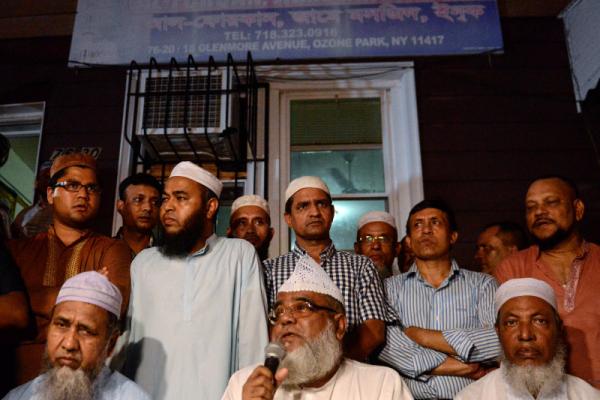Police were questioning a possible suspect in the double homicide of a popular imam and his associate in Queens but there was still no clear motive even as the shocking daylight murders were becoming a flashpoint in the national debate over anti-Islamic rhetoric.
Authorities and news reports on Monday said police had taken a “person of interest” into custody on unrelated charges and were interrogating him about the Saturday shootings of Imam Maulama Akonjee, 55, and his associate, Tharam Uddin, 64.
Both victims were wearing religious garb and walking home after prayers at a nearby mosque when a man came up behind them about 2 p.m. on a sweltering day on a street in the Ozone Park section of Queens and shot them in the head at close range.
Witnesses and video surveillance cameras depicted a man who appeared to be in his 30s or 40s fleeing the scene with a gun in his hand. A police sketch of a suspect showed a man with dark hair, a beard and glasses who was described as having a medium complexion.
Late Sunday night police detained what the New York Daily News described as a 35-year-old man who was taken into custody because his car struck a cyclist in the neighborhood shortly after the shootings. The cyclist took down the license plate and reported it to police.
Undercover officers followed the man until he rammed an unmarked police car. He was then arrested on hit-and-run charges and detectives then realized that the make of the car was the same as that of the vehicle spotted fleeing the shootings and the driver resembled the description of the alleged shooter.
As of late Monday, however, the unnamed man had not been charged in connection with the shooting of the two Muslim men.
News reports, citing police sources, speculated the shootings may have been a major escalation of a neighborhood dispute over parking between Muslims and Hispanics in the neighborhood, which is home to a growing population of Bangladeshi Muslims.
Police were not ruling out any motive and had not classified the murders as a hate crime. And at an emotional rally in the neighborhood on Monday afternoon before funerals were held for the two victims, New York City Mayor Bill de Blasio warned the crowd, “We don’t know what happened yet.”
But de Blasio also acknowledged the escalation of anti-Muslim hostility in the U.S. in recent months, much of it connected to the campaign of Republican presidential nominee Donald Trump — a hostility that the Muslim community in New York and elsewhere believes is connected to the killings.
“We know there are voices all over this country who are spewing hate, trying to create division, trying to turn one American against another,” de Blasio told the crowd.
Activists and community leaders made it clear they want much more than words of solidarity, however.
Speakers who came before de Blasio demanded that authorities classify the murders as a hate crime and one read an open letter calling the shootings “a terrorist act” motivated by hatred and fueled by the “constant rhetoric and xenophobic statements against minorities and Muslims made by the politicians and candidates.”
Trump, a New York real estate magnate born in a wealthy enclave of Queens, did nothing to allay their concerns on Monday with a major foreign policy speech in Ohio in which he reiterated his pledge to enact a temporary ban on Muslims immigrating to the country, adding that he would institute “extreme vetting” procedures.
Trump also vowed to set up a “a Commission on Radical Islam” intended to “expose the networks in our society that support radicalization” — a step that critics say would run afoul of constitutional protections.
“That’s not what America is about,” a local resident Khairul Islam, 33, told the New York Daily News. “We blame Donald Trump for this … Trump and his drama has created Islamophobia.”
Islamic advocacy groups said they hoped answers would be found quickly.
“The perpetrator of these senseless killings must be swiftly apprehended and face the full force of the law,” Afaf Nasher, executive director of the New York chapter of the Council on American-Islamic Relations, said in a statement.
CAIR’s national director, Nihad Awad, announced a $10,000 reward for information leading to the apprehension of the murderer. “Once an arrest is made, we expect that the motive of the shooter can be determined,” Awad said.
The Anti-Defamation League also weighed in, urging the NYPD “to investigate the murder as a possible bias crime.”
“Unfortunately, such incidents have the potential to make communities feel unsafe and vulnerable,” said Evan R. Bernstein, director of the ADL’s New York region.
Social media also generated a response to the media with non-Muslims around the country tweeting offers to accompany Muslims to their mosques with the hashtag #IllWalkWithYou.
Akonjee was described as a peaceful man who was beloved within Ozone Park’s large Muslim community, many of whom come from South Asia.
“He would not hurt a fly,” his nephew Rahi Majid, 26, told the Daily News. “You would watch him come down the street and watch the peace he brings.”
“We feel really insecure and unsafe in a moment like this,” Millat Uddin, an Ozone Park resident told CBS New York. “It’s really threatening to us, threatening to our future, threatening to our mobility in our neighborhood, and we’re looking for the justice.”
Got something to say about what you're reading? We value your feedback!
